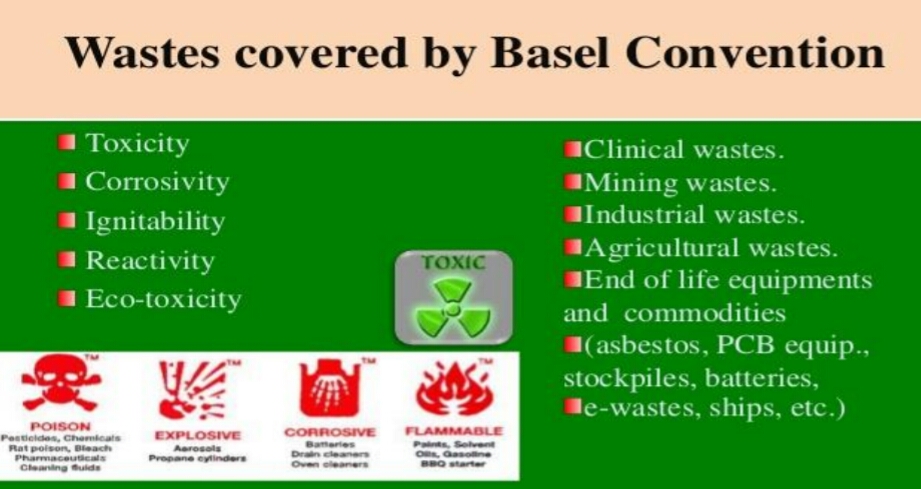Basel Convention
The Basel Convention on the Control of Transboundary Movements of Hazardous Wastes and Their Disposal, usually known as the Basel Convention, is an international treaty that was designed to reduce the movements of hazardous waste between nations, and specifically to prevent transfer of hazardous waste from developed to less developed countries (LDCs).
Note:-
It does not, however, address the movement of radioactive waste.
Date:-
The Convention entered into force on 5 May 1992.
Members:-
As of now , 185 states and the European Union are parties to the Convention.
Haiti and the United States have signed the Convention but not ratified it.
Objective of Basel Convention
The overarching objective of the Basel Convention is to protect human health and the environment against the adverse effects of hazardous wastes. Its scope of application covers a wide range of wastes defined as “hazardous wastes” based on their origin and/or composition and their characteristics, as well as two types of wastes defined as “other wastes” - household waste and incinerator ash.
Aims and Provision of Basel Convention
The provisions of the Convention center around the following principal aims:
• the reduction of hazardous waste generation and the promotion of environmentally sound management of hazardous wastes, wherever the place of disposal;
• the restriction of transboundary movements of hazardous wastes except where it is perceived to be in accordance with the principles of environmentally sound management; and
• a regulatory system applying to cases where transboundary movements are permissible.
The first aim is addressed through a number of general provisions requiring States to observe the fundamental principles of environmentally sound waste management.
A number of prohibitions are designed to attain the second aim:
Hazardous wastes may not be exported to Antarctica, to a State not party to the Basel Convention, or to a party having banned the import of hazardous wastes.
Parties may, however, enter into bilateral or multilateral agreements on hazardous waste management with other parties or with non-parties, provided that such agreements are “no less environmentally sound” than the Basel Convention.
In all cases where transboundary movement is not, in principle, prohibited, it may take place only if it represents an environmentally sound solution, if the principles of environmentally sound management and non-discrimination are observed and if it is carried out in accordance with the Convention’s regulatory system.
• The regulatory system is the cornerstone of the Basel Convention as originally adopted. Based on the concept of prior informed consent, it requires that, before an export may take place, the authorities of the State of export notify the authorities of the prospective States of import and transit, providing them with detailed information on the intended movement.
• The movement may only proceed if and when all States concerned have given their written consent.
• The Basel Convention also provides for cooperation between parties, ranging from exchange of information on issues relevant to the implementation of the Convention to technical assistance, particularly to developing countries.
• The Secretariat is required to facilitate and support this cooperation, acting as a clearing-house.
• In the event of a transboundary movement of hazardous wastes having been carried out illegally, the Convention attributes responsibility to one or more of the States involved, and imposes the duty to ensure safe disposal, either by re-import into the State of generation or otherwise.
• The Convention also provides for the establishment of regional or sub-regional centres for training and technology transfers regarding the management of hazardous wastes and other wastes and the minimization of their generation to cater to the specific needs of different regions and subregions.






0 Comments
Feel free to ask any doubt in comment section